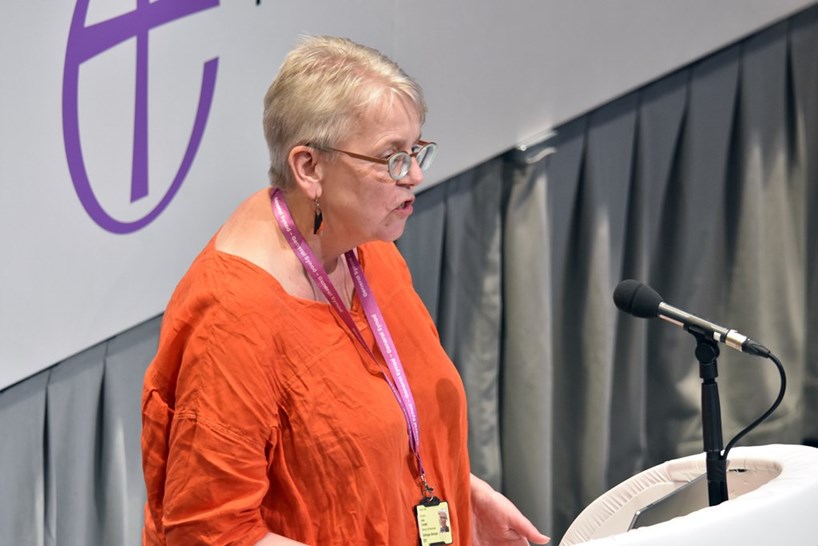THE culmination of the Synodical process to establish a redress scheme for victims and survivors of abuse in a church context was greeted with positivity, and a measure of circumspection, by both bishops and survivors.
A survivor of church-related abuse who was involved in designing the scheme, Phil Johnson, said on Monday that he was “relieved and pleased” that the General Synod had approved it, that afternoon.
“It is the culmination of years of hard work and, when it opens, it will make a huge difference in the lives of people,” he said. “For the Church, it is an opportunity to rectify some of the harm that’s been done to victims and survivors.”
Jenny Read, a survivor of abuse who was in York for the debate, told the Church Times that the passage of the Redress Measure was “a step in the right direction”, although she was worried about how long it would be until the scheme was fully operational.
The scheme has been delayed several times, and still more time will be required for it to pass through Parliament and receive Royal Assent.
The chair of the redress board, the Bishop of Winchester, the Rt Revd Philip Mounstephen, said after the vote that he could not provide “a specific date for the scheme’s opening or the first awards”, but stressed that the Church would “work cooperatively” with Parliamentarians.
A former deputy lead bishop for safeguarding, the Bishop of Birkenhead, the Rt Revd Julie Conalty, told the Church Times that the addition of her amendment — which means that those who received support under the Interim Support Scheme will not have this deducted from any sum received under the main redress scheme — would help to smooth its passage through Parliament.
 Sam Atkins/Church TimesA former deputy lead bishop for safeguarding, the Bishop of Birkenhead, the Rt Revd Julie Conalty, moves her amendment during a debate on the Measure, on Monday
Sam Atkins/Church TimesA former deputy lead bishop for safeguarding, the Bishop of Birkenhead, the Rt Revd Julie Conalty, moves her amendment during a debate on the Measure, on Monday
It would otherwise have been a “bad start”, Bishop Conalty said. “I think a number of survivors would have been very distressed if we were going to take the interim payments into account, and would be speaking to their MPs.”
She was “beyond delighted” that the scheme was off the ground. “The process isn’t finished, but, in terms of Synod, we’ve done the work that we needed to do.”
Bishop Mounstephen said that “scrutiny” from the Synod had been vital to ensure that the scheme was “robust and credible”. He said: “I welcome the spirit in which today’s debate was held, and our commitment now is to clearly communicate this outcome to survivors.”
Ms Read said that the potential stress of the application process remained a worry, as she was sceptical about assurances that it would be straightforward.
“It’s like when the dentist says ‘this isn’t going to hurt,’” she said, suggesting that it would be better for the Church to be “upfront” if, given legalities, the process was going to be complex and potentially intrusive.
The appointment of the law firm Kennedy’s as the independent administrators of the scheme gave Bishop Conalty more confidence that the scheme would be well administered, she said. It was better for the Church not to do this work itself, she said; without the necessary expertise, this would risk retraumatising survivors.
Audio, rather than written, applications could be made to the scheme, she added, which would make the process more accessible.
Bishop Mounstephen said that he was “confident that the application process will be person-centred and trauma-informed” and that it would “treat all applicants with dignity, respect and compassion”.
Ms Read has been awaiting redress for a long time. She recently reported to the BBC that, as children, she and her two sisters, Wendy and Christina, were sexually abused by their father; a male curate; and a female churchwarden in “sadistic rituals” within a church in the north-east of England (News, 20 June). The Church conducted a lessons-learnt review into her case, which has not been published for legal reasons. The Archbishop of York has promised to issue a formal apology.
Ms Read said that she had received some support from the Interim scheme, but that one of her sisters had given up due to the difficulties of accessing this help. Ultimately, though, it was not about the money, she said. “It’s not a matter of getting what I’m owed. The reason why I’m here is that I can’t let people get away with it without saying ‘this is wrong.’”
Prospective applicants for the redress scheme can register their interest at www.redresscofe.org from Friday.

















